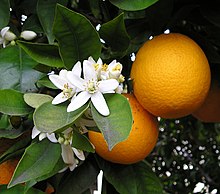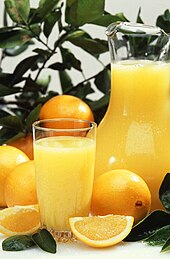橙
此條目可参照英語維基百科相應條目来扩充。 |




橙為多種柑橘属水果的總稱,属于芸香科(参见被称为橙的植物列表),一般多指甜橙(学名:Citrus × sinensis)[1] 。另有苦橙(学名: Citrus × aurantium)。甜橙会进行无性生殖,使得各种甜橙通过突变产生。 [2][3][4][5]
橙是柚子(Citrus maxima)和橘(Citrus reticulata)的杂交种[2][6]。橙的叶绿体基因组,也就是母系是柚[7]。甜橙有自己的完整基因组测序。[2]
橙起源于中国南方、印度东北部和缅甸地区[8][9]。在公元前314年,中国文献最先描述了甜橙[2]。截至1987年[update],人们发现橙树是世界上最多的耕作果树[10]。橙树大量生长于热带和亚热带地区,以生成橙。橙树的果实,也就是橙可以直接生吃,或是榨成橙汁和有香气的橙皮的来源[11]。截至2012年[update],甜橙约占柑橘属产量的70%[12]。
在 2017年,全球一共生长了7300万吨的橙,其中巴西就生长了其中的24% ,紧接着的是中国和印度。[13]
橙内含十分丰富的维生素C,因此在大航海時代,葡萄牙、西班牙和荷蘭的水手在貿易路線上種植柑橘樹以預防壞血病。
历史
[编辑]
甜橙不是一种野果[14],归因于不纯的橘子与杂种柚之间的杂交,而杂种柚具有大量柑的基因。由于其叶绿体DNA是柚子的叶绿体DNA,因此它可能是杂种柚子。它也许是BC1柚子回交的产物,是第一个橙的母本。 [7][15] 根据基因组分析,甜橙中祖先物种的相对比例约为42%的柚子和58%的柑。 [16] 甜橙的所有变种都来自这个原始的杂交品种,仅在农业繁殖过程中选择的突变有所不同。 [15] 甜橙的起源与苦橙的起源截然不同,苦橙是由纯橘子和柚子亲本杂交而成的,也许它是在野生环境中独立产生的。 [15] 最早描述甜橙的中国文献来自公元前 314 年。[2]
在欧洲,摩尔人将橙引入伊比利亚半岛(当时的安达卢斯),从10世纪开始大规模种植。这一点已通过专门用于种植橙果园的复杂灌溉技术得到证明。 [17] 柑橘类水果-其中包括苦橙-在西西里酋长国时期于9世纪引入西西里岛,但是直到15世纪末或16世纪初,甜橙才广为人知。这时是意大利和葡萄牙商人将橘子树带入地中海地区的时候。 [10] 此后不久,甜橙迅速被用作可食用的水果。它也被认为是奢侈品,有钱人会在私人音乐学校种橘子,称为orangerie。1646年,甜橙在整个欧洲广为人知。 [10] 法国的路易十四非常喜欢橘子树,并在凡尔赛宫建造了最宏伟的凡尔赛宫橘子室。 [18] 在凡尔赛宫,宫殿的整个房间都摆放着用实心银盆栽栽种的橘子树,而橘园则允许全年种植这种水果,以供宫廷使用。 1664年,路易十四谴责其财政部长尼古拉斯·富凯时,他没收的部分宝藏是位于子爵城堡的富凯庄园的一千多棵橘树。 [19]
参考资料
[编辑]- ^ Citrus ×sinensis (L.) Osbeck (pro sp.) (maxima × reticulata) sweet orange. Plants.USDA.gov. (原始内容存档于2011-05-12).
- ^ 2.0 2.1 2.2 2.3 2.4 Xu, Q; Chen, LL; Ruan, X; Chen, D; Zhu, A; Chen, C; Bertrand, D; Jiao, WB; Hao, BH; Lyon, MP; Chen, J; Gao, S; Xing, F; Lan, H; Chang, JW; Ge, X; Lei, Y; Hu, Q; Miao, Y; Wang, L; Xiao, S; Biswas, MK; Zeng, W; Guo, F; Cao, H; Yang, X; Xu, XW; Cheng, YJ; Xu, J; Liu, JH; Luo, OJ; Tang, Z; Guo, WW; Kuang, H; Zhang, HY; Roose, ML; Nagarajan, N; Deng, XX; Ruan, Y. The draft genome of sweet orange (Citrus sinensis). Nature Genetics. Jan 2013, 45 (1): 59–66. PMID 23179022. doi:10.1038/ng.2472
 .
.
- ^ Orange Fruit Information. 2017-06-09 [2018-09-20]. (原始内容存档于2019-06-01).
- ^ Orange fruit nutrition facts and health benefits. [2018-09-20]. (原始内容存档于2009-08-21).
- ^ Oranges: Health Benefits, Risks & Nutrition Facts. [2018-09-20]. (原始内容存档于2014-04-25).
- ^ Andrés García Lor. Organización de la diversidad genética de los cítricos (PDF) (学位论文): 79. 2013 [2021-07-06]. (原始内容存档 (PDF)于2021-02-25).
- ^ 7.0 7.1 Velasco, R; Licciardello, C. A genealogy of the citrus family. Nature Biotechnology. 2014, 32 (7): 640–642. PMID 25004231. S2CID 9357494. doi:10.1038/nbt.2954.
- ^ Morton, Julia F. Fruits of Warm Climates. 1987: 134–142 [2021-01-30]. (原始内容存档于2019-05-26).
- ^ Talon, Manuel; Caruso, Marco; Gmitter, Jr., Fred G. The Genus Citrus. Woodhead Publishing. 2020: 17 [2021-01-30]. ISBN 9780128122174. (原始内容存档于2020-08-19).
- ^ 10.0 10.1 10.2 Morton, J. Orange, Citrus sinensis. In: Fruits of Warm Climates. NewCROP, New Crop Resource Online Program, Center for New Crops & Plant Products, Purdue University: 134–142. 1987 [2021-01-30]. (原始内容存档于2000-11-10).
- ^ Citrus sinensis. Germplasm Resources Information Network (GRIN). USDA.
- ^ Organisms. Citrus Genome Database. (原始内容存档于2012-08-24) (英语).
- ^ Production of oranges, 2017 – choose "Production, Crops, World Regions" in the left margin and picklist. United Nations, Food and Agricultural Organization, FAO Statistics. 2018 [2019-07-23]. 原始内容存档于2023-05-28.
- ^ Hodgson, Willard. Chapter 4: Horticultural Varieties of Citrus. Webber, Herbert John; rev Walter Reuther and Harry W. Lawton (编). The Citrus Industry. Riverside, California: University of California Division of Agricultural Sciences. 1967–1989 [1943]. (原始内容存档于2012-02-05).
- ^ 15.0 15.1 15.2 G Albert Wu; et al. Sequencing of diverse mandarin, pomelo and orange genomes reveals complex history of admixture during citrus domestication. Nature Biotechnology. 2014, 32 (7): 656–662. PMC 4113729
 . PMID 24908277. doi:10.1038/nbt.2906.
. PMID 24908277. doi:10.1038/nbt.2906.
- ^ Wu, Guohong Albert; Terol, Javier; Ibanez, Victoria; López-García, Antonio; Pérez-Román, Estela; Borredá, Carles; Domingo, Concha; Tadeo, Francisco R; Carbonell-Caballero, Jose; Alonso, Roberto; Curk, Franck; Du, Dongliang; Ollitrault, Patrick; Roose, Mikeal L. Roose; Dopazo, Joaquin; Gmitter Jr, Frederick G.; Rokhsar, Daniel; Talon, Manuel. Genomics of the origin and evolution of Citrus. Nature. 2018, 554 (7692): 311–316. Bibcode:2018Natur.554..311W. PMID 29414943. doi:10.1038/nature25447
 . and Supplement
. and Supplement
- ^ Trillo San José, Carmen. Water and landscape in Granada. Universidad de Granada. 2003-09-01 [2021-04-02]. (原始内容存档于2020-08-11).
- ^ Jean-Baptiste Leroux. The Gardens of Versailles. Thames & Hudson. 2002: 368.
- ^ Nancy Mitford. The Sun King. Sphere Books Ltd. 1966: 11.
外部链接
[编辑] 维基共享资源上的相關多媒體資源:橙
维基共享资源上的相關多媒體資源:橙 維基物種上的相關信息:橙
維基物種上的相關信息:橙- Citrus sinensis List of Chemicals (Dr. Duke's Phytochemical and Ethnobotanical Databases), USDA, Agricultural Research Service.
- Oranges: Safe Methods to Store, Preserve, and Enjoy. (2006). University of California Agriculture and Natural Resources. Accessed May 23, 2014.

